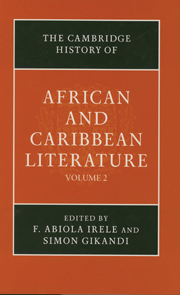Book contents
- Frontmatter
- 23 East African literature in English
- 24 Anglophone literature of Central Africa
- 25 West African literature in English: beginnings to the mid-seventies
- 26 South African literature in English
- 27 African literature in French: sub-Saharan Africa during the colonial period
- 28 North African literature in French
- 29 Francophone literatures of the Indian Ocean
- 30 African literature in Spanish
- 31 African literature in Portuguese
- 32 Popular literature in Africa
- 33 Caribbean literature in French: origins and development
- 34 Caribbean literature in Spanish
- 35 Anglophone Caribbean literature
- 36 The Harlem Renaissance and the Negritude movement
- 37 Postcolonial Caribbean identities
- 38 African literature and post-independence disillusionment
- 39 “Postcolonial” African and Caribbean literature
- 40 Modernism and Postmodernism in African literature
- Index
- References
23 - East African literature in English
Published online by Cambridge University Press: 28 March 2008
- Frontmatter
- 23 East African literature in English
- 24 Anglophone literature of Central Africa
- 25 West African literature in English: beginnings to the mid-seventies
- 26 South African literature in English
- 27 African literature in French: sub-Saharan Africa during the colonial period
- 28 North African literature in French
- 29 Francophone literatures of the Indian Ocean
- 30 African literature in Spanish
- 31 African literature in Portuguese
- 32 Popular literature in Africa
- 33 Caribbean literature in French: origins and development
- 34 Caribbean literature in Spanish
- 35 Anglophone Caribbean literature
- 36 The Harlem Renaissance and the Negritude movement
- 37 Postcolonial Caribbean identities
- 38 African literature and post-independence disillusionment
- 39 “Postcolonial” African and Caribbean literature
- 40 Modernism and Postmodernism in African literature
- Index
- References
Summary
In 1962, an important conference on African writing “Of English Expression” took place in Kampala, Uganda. As the Kenyan writer Ngugi wa Thiong’o was to recall almost thirty years later, the list of participants at the conference “contained most of the names which have now become the subject of scholarly dissertations in universities all over the world” (1981b: 5). But among the many luminaries attending the conference at Makerere Hill – among whom Chinua Achebe and Peter Abrahams were prominent – none were from East Africa. And since writers in African languages had not been invited to the conference, the most important East African writers, such as the Swahili poet Sir Shabaan Robert, were excluded by default. Among the assembled makers of African literature, the East African region was represented by student writers and apprentices (Ngugi, Rebecca Njau, and Grace Ogot) whose only claim to literary reputation was a few short stories in college journals such as Penpoint. The Kampala conference was, nevertheless, a remarkable event in the history of African writing in English: it raised many significant questions about the historical and cultural conditions in which African literature was produced, its relation to literatures in the African diaspora, and the epistemological and theoretical questions that were central to the identity of an emergent literature, including what came to be known as the language question. The conference had brought together a distinctive group of writers from Africa and its diaspora, and in doing so it had come to embody what Ngugi was later to characterize as “the energy and the hope and the dreams and the confidence … of a continent emerging from a colonial era” (1981b: 142).
- Type
- Chapter
- Information
- The Cambridge History of African and Caribbean Literature , pp. 425 - 444Publisher: Cambridge University PressPrint publication year: 2000

